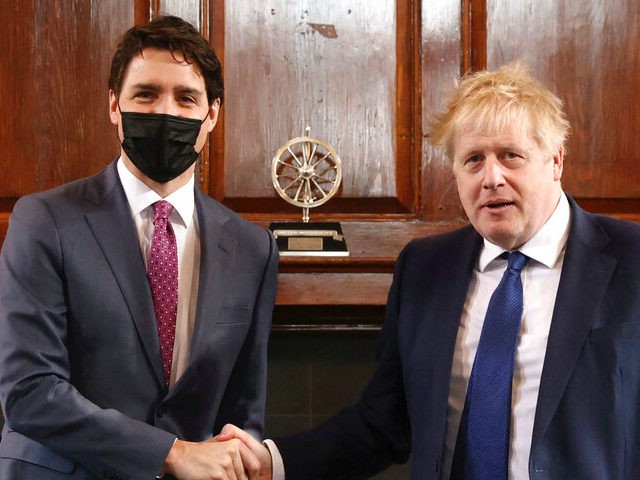Canada’s National Post on Monday found leftist Prime Minister Justin Trudeau awkwardly trying to upsell Canadian fossil fuels to countries that have decided to boycott Russian oil, while at the same time insisting Canada remains committed to its “green energy” goals.
After meeting with British Prime Minister Boris Johnson and Dutch Prime Minister Mark Rutte in London on Monday to discuss the Russia-Ukraine situation, Trudeau conceded that boycotting Russian oil was easier for Canada than many European countries since Canada imports very little of its oil from Russia.
Trudeau then tried to offer Canada’s assistance to blunt the impact of lost Russian oil in Europe, but he was rather vague on how Canadian products could fill that Russia-shaped hole in the Euro economy.
“What we’re seeing is a shift in Europe and elsewhere to understand that Russia is no longer a reliable partner. What Vladimir Putin has broken here is a trust. We will be there to support, as the world moves beyond Russian oil and indeed, beyond fossil fuels, to have more renewables in our mix,” Trudeau said.
“What we are learning about Russia’s unreliability as a trading partner needs to be remembered,” he insisted.
The National Post quoted Canadian analysts who said ramping up the country’s oil and gas exports would require a sharp turn away from Trudeau’s previous focus on shifting to renewables. Among other problems, Canada lacks the port and pipeline facilities needed to significantly increase export shipments.
“It must be a priority for Europe to get less dependent on Russia, and if Canada would have invested in energy capacity, or even oil pipelines to the east, we could be now contributing to European security,” University of Calgary professor Yrjo Koskinen mournfully observed.
Canadian Association of Petroleum Producers (CAPP) CEO Tim McMillian suggested the Trudeau administration could swiftly remove various regulatory barriers to developing greater export capacity if Trudeau is serious about stepping up to help Europe move away from Russian oil.
“We have the resources. We have projects that are actively trying to get approved. We have interest from German utilities that were backstopping several of those LNG facilities,” McMillian said, referring to infrastructure for exporting liquid natural gas.
Last week, CAPP urged the Canadian government to back away from strict environmental regulations that have delayed and canceled several major oil and gas projects.
“Over the last decade, issues like energy security and country of supply have not been very high on the public’s radar. If we act on what we now know, we can build the infrastructure to make this a far more stable world,” McMillian said last week, pointing to the Ukraine conflict as a wake-up call.
Alberta Premier Jason Kenney piquantly pitched in his own criticism of U.S. President Joe Biden for canceling the Keystone XL pipeline, stating that “Alberta oil is better than dictator oil.”
Canada’s oilsands crude producers achieved record export shipments in January 2022, thanks to a pipeline that sends oil from Alberta to export facilities along the U.S. Gulf Coast. Most of this oil was imported by India, China, and South Korea.
“The development marks a sea change for Canada’s oil industry. The country holds the third-highest crude reserves in the world, but exports to markets beyond the U.S. have been limited due to a lack of infrastructure,” the Financial Post observed in January.
“Canada has faced severe opposition from activists for building pipelines from the oil sands region to British Columbia’s Pacific Coast. Additionally, the Biden Administration last year blocked the Keystone XL pipeline, effectively shutting Canada’s crude out of the global market,” the report noted.
Calls to increase Canadian and American energy production will fall on deaf ears in the environmentalist community, which in both countries sees the Ukraine-Russia crisis as a vehicle for accelerating the end of fossil fuels and the changeover to their fantasy “green economies,” not a reason to abandon climate change restrictions.
“I actually think this is going to accelerate the end of the age of oil,” Greenpeace Canada’s Keith Sterwart said last week, accusing the oil industry and its supporters of “overplaying their hand” after the Russia-Ukraine oil shock.

COMMENTS
Please let us know if you're having issues with commenting.